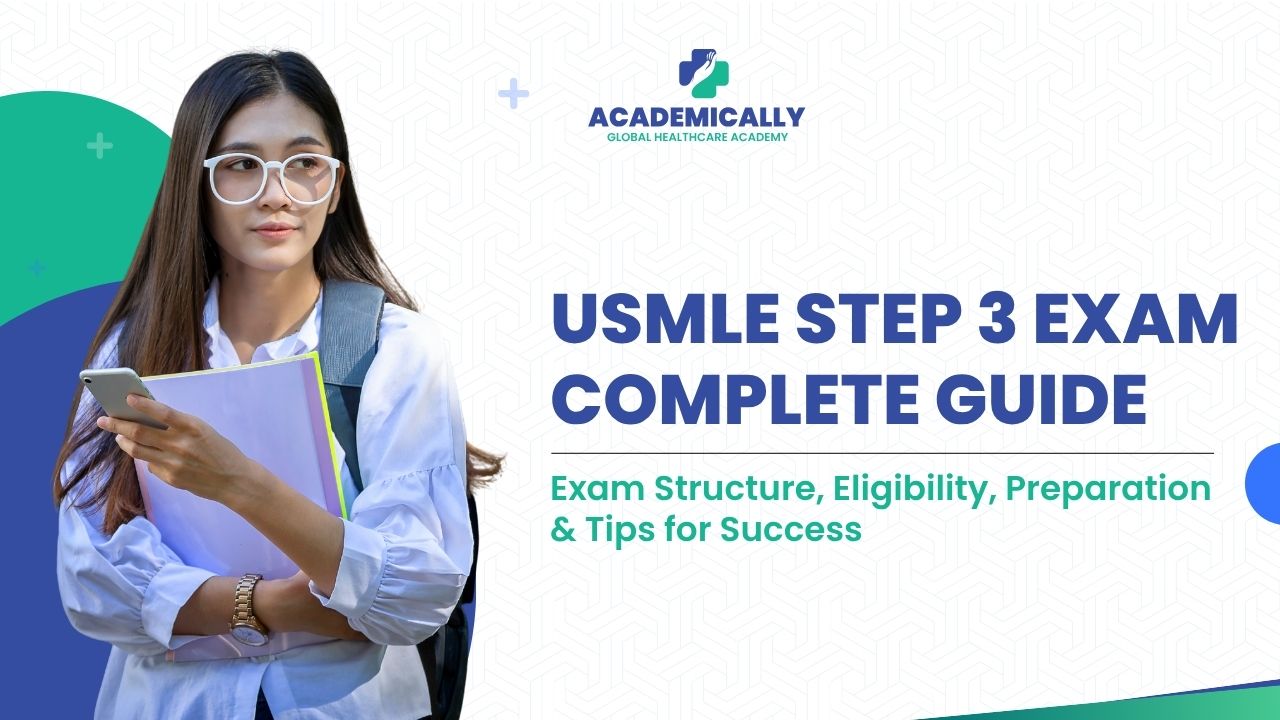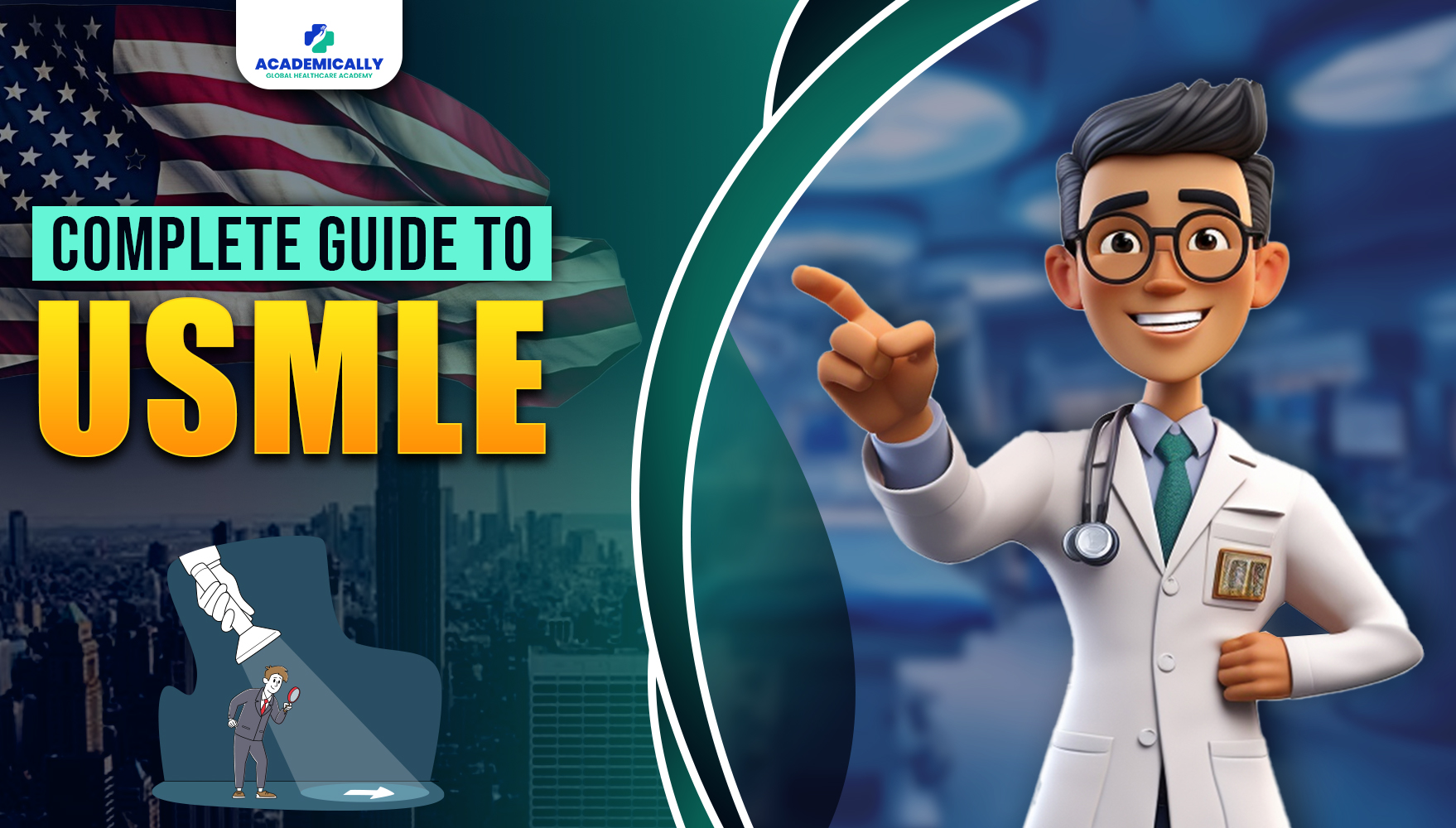USMLE Step 3 Eligibility Criteria (2025)
You are eligible to take the USMLE Step 3 if:
| Requirement | Details |
| Step 1 & Step 2 | Both must be passed |
| Medical Degree | MD/DO from the US/Canada or ECFMG-certified foreign degree |
| Certification | ECFMG (for IMGs) required |
| Residency (Recommended) | Completion or near-completion of 1 year in an accredited US GME program |
Tip: Many states require at least 1 year of postgraduate training before granting licensure, even after passing Step 3.
Are you eligible for the USMLE Step 3? Let’s check where you stand.
USMLE Step 3 Exam Structure
Day 1: Foundations of Independent Practice (FIP)
| Feature | Details |
| Format | 232 MCQs in 6 blocks |
| Time per Block | 60 minutes |
| Total Duration | ~7 hours (incl. breaks + tutorial) |
| Break Time | 45 minutes (can be extended) |
Syllabus
| Competency | Range, % |
| Medical Knowledge: Applying Foundational Science Concepts | 11–12 |
| Patient Care: Diagnosis | 33–36 |
| History/Physical Exam | 5–9 |
| Laboratory/Diagnostic Studies | 9–12 |
| Diagnosis | 6–10 |
| Prognosis/Outcome | 8–11 |
| Patient Care: Management | 32–35 |
| Health Maintenance/Disease Prevention | 6–11 |
| Pharmacotherapy | 9–13 |
| Clinical Interventions | 5–9 |
| Mixed Management | 6–11 |
| Practice-based Learning & Improvement | 11–13 |
| Communication / Professionalism / Systems-based Practice & Patient Safety | 7–9 |
Day 2: Advanced Clinical Medicine (ACM)
| Feature | Details |
| Format | 180 MCQs + 13 CCS cases |
| Time per MCQ Block | 45 minutes |
| Time per CCS Case | 10 or 20 minutes (real-time) |
| Total Duration | ~9 hours (incl. CCS tutorial + breaks) |
| Break Time | Minimum 45 minutes |
Syllabus
| Competency | Range, % |
| Medical Knowledge: Applying Foundational Science Concepts | 11–12 |
| Patient Care: Diagnosis | 33–36 |
| History/Physical Exam | 5–9 |
| Laboratory/Diagnostic Studies | 9–12 |
| Diagnosis | 6–10 |
| Prognosis/Outcome | 8–11 |
| Patient Care: Management | 32–35 |
| Health Maintenance/Disease Prevention | 6–11 |
| Pharmacotherapy | 9–13 |
| Clinical Interventions | 5–9 |
| Mixed Management | 6–11 |
| Practice-based Learning & Improvement | 11–13 |
| Communication and Professionalism | 7–9 |
Also Read: Top Recommended Books For The USMLE Exam
How to Prepare for USMLE Step 3 (2025)
Let’s be real, most people don’t treat Step 3 as seriously as Steps 1 or 2 CK. Some wait until residency starts. Others rush through it just to “get it done.” But if you want to pass comfortably (or even aim for a solid score), you do need a plan, especially for CCS cases and Day 1’s non-clinical content.
Start with Day 1 Topics
Day 1 presents a diverse range of topics, including biostatistics, ethics, foundational science, and preventive medicine. It’s less clinical, more “conceptual.” Many IMGs underestimate how much Day 1 affects the overall score.
- Revisit biostatistics formulas and interpretation questions.
- Practice ethics scenarios- consent, confidentiality, error disclosure.
- Brush up on quality improvement and systems-based practice.
Plan for Day 2’s Real Challenge: CCS Cases
This is where many strong candidates struggle. Why? Because it’s not just recall — it’s real-time clinical decision-making. You’ll need to:
- Order tests in the correct sequence
- Start treatment without unnecessary delays
- Advance time appropriately and reassess often
- Complete counseling, monitoring, and discharge planning
Create a Realistic Study Plan
- If you’re working or in residency, a tight 4–6 week plan is realistic:
- Weekdays: 1–2 hours of focused study
- Weekends: Full-length practice blocks or CCS case simulations
- Final 7–10 days: Review core concepts + simulate real test days
Exam Strategy
Here’s what has helped many test-takers pass comfortably, even on a busy schedule:
| Strategy | Why It Matters |
| Focus on your clinical instincts | Step 3 is less about facts, more about what you’d do next for the patient |
| Simulate test days | Helps build stamina for long sessions (7–9 hours/day) |
| Practice timed decision-making | CCS cases are time-sensitive; efficiency is key |
| Review high-yield patient safety, ethics, and communication | These show up more than you expect |
| Don’t skip breaks | Sounds obvious, but pacing affects performance |
Common Mistakes (and How to Avoid Them)
- Avoid these if you want to stay sane and pass:
- Underestimating Day 1 content (especially biostats and ethics)
- Practicing CCS cases too late or only once
- Advancing time in CCS without reassessment
- Forgetting patient education and follow-up plans
- Ignoring stamina-building, this is a 2-day test!
Also Read: Doctor Salary in USA
Final Thoughts
Let’s be honest. Step 3 isn’t just another exam. It’s the last push before full licensure, and often the most overlooked. Between long work hours, study fatigue, and those tricky CCS cases, it’s easy to feel lost in prep mode. But if there’s one thing to take away from this guide, it’s this: preparing smart beats preparing hard.
Break it down, start early, and don’t let Day 1 topics fool you; they count more than you think. And when it comes to CCS, the goal isn’t perfection. It’s clinical clarity and confidence.
No matter if you’re an IMG, a U.S. grad, or somewhere in between, you’ve already made it this far. Now it’s just about crossing the finish line, strategically, not stressfully.
If you still have any questions or doubts, you can reach out to experts at Academically who can help you make the process easier.






